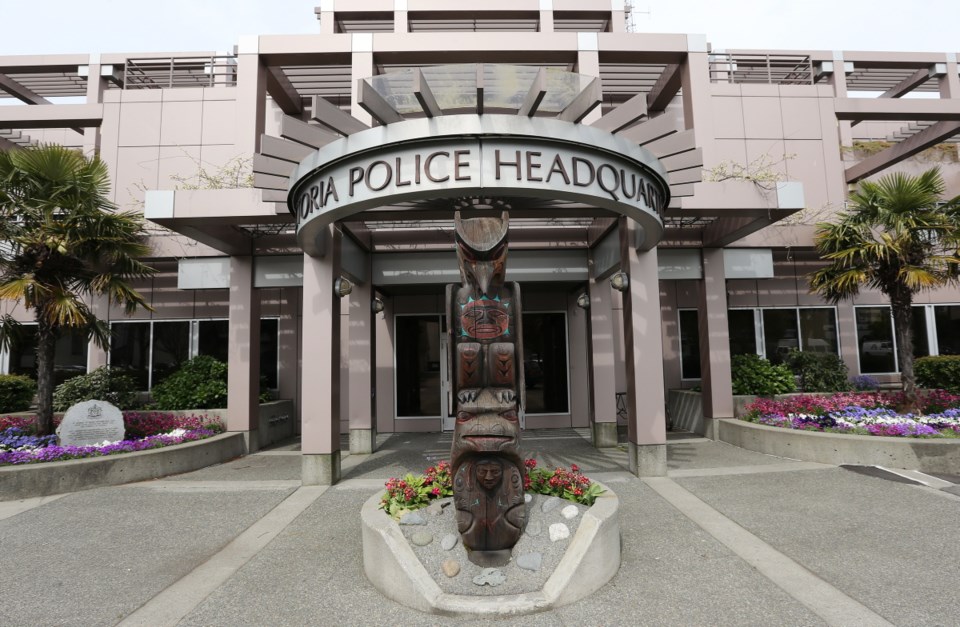Victoria councillors unanimously approved a motion Thursday that calls on the Victoria Police Department to end “street checks” or “carding,” the practice of collecting and storing the identification of people who are not under arrest.
The motion declares that street checks and carding are against the priorities, goals and objectives of the City of Victoria and asks the Victoria and Esquimalt Police Board and the Victoria Police Department to take immediate action to ban the practice.
Councillors backed the motion at committee of the whole, but added an amendment asking Victoria Police Chief Del Manak and provincial director of police services Brenda Butterworth-Carr to make a presentation to council on the policies and practices around street checks. Councillors will vote again on the motion at a council meeting next week.
In supporting the motion, Coun. Sarah Potts, citing “people’s lived experience,” said the checks disproportionately affect Black and Indigenous communities, people of colour, people without homes and people living in poverty. “It is always worth questioning whether the harms outweigh the benefits when you think about the impacts street checks have on marginalized communities and how these interactions ultimately undermine trust with the police,” Potts said.
Coun. Sharmarke Dubow, the first Black city councillor to be elected in Victoria in 152 years and the first Somali-Canadian Victoria councillor, said he has been the subject of arbitrary street checks in Vancouver, Toronto and Edmonton, although not in Victoria. He said the issue has come to the forefront because of the Black Lives Matter movement and reflects calls for change around the country as Black, Indigenous and communities of colour demand equitable treatment.
A letter distributed by the B.C. Civil Liberties Association last week, signed by 73 organizations, called on the City of Vancouver, Premier John Horgan, Public Safety Minister Mike Farnworth and Butterworth-Carr to “take immediate action to address systemic discrimination in policing by ending all street checks in Vancouver and B.C.”
Police officers perform street checks when they ask someone for information even though the person is not under arrest or the subject of a criminal investigation, according to Ontario Justice Michael Tulloch, who wrote a report in 2019 calling for an end to random carding.
Carding is when an officer randomly asks someone to provide identifying information when there is no suspicious activity, the individual is not suspected of any offence and there’s no reason to believe they have information on any offence, Tulloch wrote in his report. In both cases, the identifying information is stored in a police database, where it can be referred to in the future.
A January 2020 report by the Victoria Police Department defines street checks as “when a police officer proactively conducts a field interview or investigation with a member of the public related to suspicious activity or a suspected crime.”
Manak said in a statement he acknowledges the overrepresentation of racialized individuals in many aspects of society, including the criminal justice system. That’s why it’s important for police services to recognize the potential for bias and take steps to ensure those services are delivered in a way that’s bias-free, he said.
“With regard to street checks, I can tell you that VicPD does not support random or arbitrary stops of any kind. I do, however, support officers initiating conversations with individuals in the community where there is a reasonable and unbiased reason to do so.”
Manak said based on an analysis of street-check data entered in its PRIME records management system in 2017, the department found that 10 per cent of the people who were checked were Black, Indigenous, and people of colour. Statistics Canada’s 2016 census data show Black, Indigenous and people of colour represent 18 per cent of the population of Victoria and Esquimalt.
However, the department’s street-check report noted several problems with the data, including inconsistency among officers on what constitutes a street check and the fact that about six per cent of the street-check entries did not include an individual’s ethnicity.
Manak said communities expect all police interactions with the public to be conducted without bias or discrimination and that principle is reflected in VicPD’s street-check statistics.
Such interactions often begin with a conversation when a police officer views unusual, suspicious, or potentially criminal behaviour, Manak said. He said the department does not support the practice of “carding” where there is no suspicious activity or any reason to believe the individual has information on an offence.
The Supreme Court of Canada has confirmed that an important function of the police is to stop and talk to individuals, Manak said, but police must carry out their duties in accordance with the Canadian Charter of Rights and Freedoms and the Police Act.
“Crime prevention is essential to the maintenance of public safety and the police must have proper tools to undertake this work,” Manak sad. “If our officers see suspicious situations, potential criminal activity or any other potential issue related to public safety, I believe our communities expect officers to make inquiries.”
> Police chief’s viewpoint, A14



